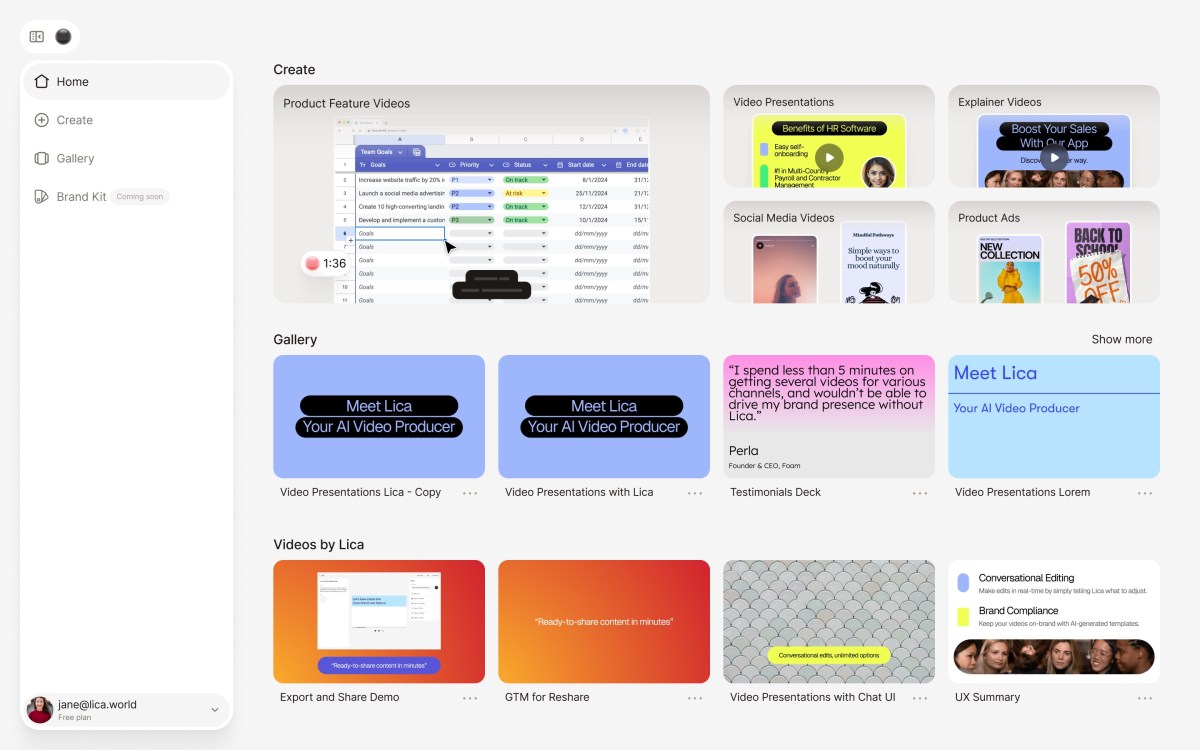Product teams often have tons of screen recordings and screenshots that end up unused. Video production using those screen recordings has been time-consuming and expensive. That’s why two former Microsoft employees started to build Lica, which is an AI tool that easily creates tutorials and product videos out of screenshots and screen recordings.
The startup was founded in 2023 by Priyaa Kalyanaraman, who has worked as a product manager at Microsoft, Snap, and Waymo, and Purvanshi Mehta, who worked at Microsoft as a data scientist and project manager.
Kalyanaraman — who worked on PowerPoint and Microsoft Designer, including on adding AI features to these products — said that she saw a lot of demand from business users to add AI assistants to business creation.
“I wanted to start something, give everyday people design agents that help them communicate better. But I was on a visa, and it was challenging for me to start my own company. I built a small demo in a hackathon and put it on Twitter (now X), where Replit’s Amjad Masad saw it and expressed interest,” Kalyanaraman said.

Mehta was also building projects of her own for content personalization. A mutual friend introduced them both, and they decided to build a tool for video storytelling because they felt tools were flashy and ineffective.
Lica has raised $4 million in a seed round led by Accel, with participation from SouthPark Commons, Village Global, and angels like Replit CEO Amjad Masad, former a16z general partner Balaji Srinivasan and Replit president Michele Catasta.
Aditya Agarwal, a managing partner at South Park Commons who has worked at companies like Dropbox and Meta, said traditionally, people would build a combination of documents and slides to get their ideas across. On the other hand, video development was expensive and time-consuming. He believes Lica is plugging that gap.
“The vast majority of the time, we would report using a combination of documents and slides because these are artifacts that anybody can produce in an organization. To produce videos, we went to different agencies depending on the requirement. We wouldn’t produce a video for a lot of communication internally or externally because it wasn’t feasible,” Agarwal said.
The duo first started work on a model that gives you the ability to process any kind of multimodal input and predict the sequence of action and product-specific media according to that. However, the company decided to focus on video first, targeting prosumers and teams like the product, customer success, and sales.
The startup has a tool that helps you build a product video or an explainer out of a screen recording. Lica can automatically add transitions, background music and effects. The company’s editing tool gives you the freedom to add some parts, like text for narration manually. You can also guide the AI assistant through prompts to give the video a specific voice, such as “Make a tutorial-styled video in Gen-Z language.”
Once the video is generated, you can also edit parts like voiceover tone, captions, language, style, and music through prompts.
“A lot of people don’t have the vocabulary of what they want out of a video. That leads to multiple time-consuming iterations until they get the final video. We are giving you an AI assistant who acts like your video producer and works quickly,” Kalyanaraman said.

The founders noted that the tool also understands design aesthetics well. In instances where a user inputs unusual design or color choices, the tool makes sure that the end product looks pleasant and not off-putting.
Mehta mentioned that an AI assistant has two kinds of models: an orchestrator that puts together different parts of the presentation, including choosing the best voice for the narration, and a layout generator that takes care of how different parts of screen recording or text appear on the screen. The company uses a mix of open-source and close-source models for other parts like audio generation.
Lica currently has a free tier that allows you to create 10 videos with a limit of 3 minutes per video and 3 downloads per month. You can pay $49 a month to generate unlimited 10-minute videos and get 10 downloads along with access to branded templates.
While the current focus of the startup is on product and tutorial videos, in the upcoming months, Lica will look to tune its AI assistant for more formats of videos, such as marketing, presentation, social media, and investor pitches.
Lica might not have direct competitors, but companies and startups generally use anything from a Zoom call to screen recording to make a rudimentary video, with a tool like Loom to polish it up. AI-centric startups like D-ID and Syenthesia have used avatars for tutorial videos or internal messaging.
Accel’s Sameer Gandhi believes the startup has right mix of quality of the team and its product approach.
“Lica differentiates itself by combining advanced AI capabilities with intuitive design in a single platform, allowing users to maintain creative control while benefiting from AI-assisted capabilities. Coupled with the team’s generative AI and product development background, we believe they’re uniquely positioned to address a key market need that other solutions have yet to fully capture,” he told TechCrunch over email.

